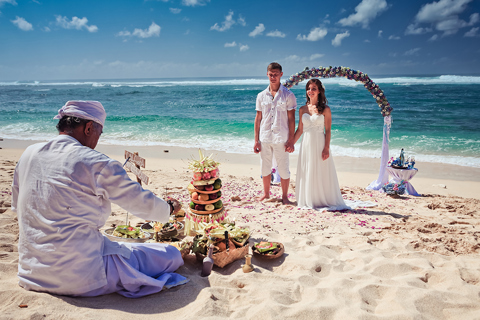Is my overseas marriage recognised in Australia?

Many Australians dream about having a destination wedding in an exotic location like Thailand, Hawaii or even Las Vegas. However, that dream can turn into a nightmare if the parties don’t have a good understanding of the legalities involved with getting married overseas. Here’s everything you need to know about having an overseas marriage legally recognised in Australia.
What is marriage?
Before we look at whether an overseas marriage would be recognised in Australia, it’s important to understand the legal requirements for marriage in Australia.
The Marriage Act 1961 (the Act) defines marriage as:
“the union of two people to the exclusion of all others, voluntarily entered into for life”.
To get married in Australia, you must meet certain criteria.
This includes:
-
not being currently married to another person;
-
not intending to marry a family member; and
-
being at least 18 years of age.
In addition to meeting the above requirements, you must also follow a specific process like giving at least 1 months’ notice of your intention to marry.
You can read more about the legal requirements to get married in our earlier blog, “Legal requirements to get married in Australia”.
When are overseas marriages recognised in Australia?
The Act outlines the rules that govern whether an overseas marriage is legally recognised in Australia. You need to meet the following requirements:
-
The law of the country in which you married considers your marriage as valid; and
-
Australian law would recognise the marriage as valid if it took place in Australia.
There is no legal requirement to have an overseas marriage registered in Australia. Instead, you would be required to have evidence of the overseas marriage, such as a marriage certificate from the country where the marriage took place.
According to Section 88G (1) of the Act, an:
“original or certified copy of a marriage certificate or record of marriage issued by a competent authority in a foreign country is evidence of the occurrence of the marriage and of the validity of the marriage”.
A “competent authority” is anyone considered competent or having authority under the law of the country where the marriage took place.
When are overseas marriages not recognised in Australia
Section 88D of the Act outlines the grounds that would make an overseas marriage invalid in Australia.
These grounds are:
-
At the time of the marriage, one of the parties was legally married to another person;
-
One of the parties was not of ‘marriageable’ age in Australia;
-
The parties were in a prohibited relationship (e.g. parent/child, siblings);
-
One party had obtained the consent from the other:
-
under duress;
-
fraudulently;
-
where one of the parties mistook the identity of the other party;
-
where they did not understand the nature of the marriage ceremony; or
-
where one of the parties did not have mental capacity.
It is worth noting that culturally arranged marriages are still legally recognised in Australia as long as they meet the requirements listed above. In Australia, there is no legal requirement to be ‘in love’ with the person you marry.
Things to consider if you are planning to marry overseas
Anyone planning to travel overseas to get married should have an understanding of the legal requirements in Australia and in the country they intend to marry in. Some countries may require the couple to be of a faith group recognised by their government, while others may require a period of residency before they will permit a couple to marry.
Some countries will ask you to prove you aren’t already married to someone else. The most commonly requested documents are:
-
Certificate of No Impediment to Marriage (CNI); or
-
Certificates from a registry of births, deaths and marriages; or
-
Divorce Certificates.
The Department of Foreign Affairs and Trade can issue a CNI in Australia, however some countries only accept CNIs issued in their own country.
A registry of births, deaths and marriage may issue a Single Status Certificate, which certifies you have not been married during a specified period. However, these are not issued in every jurisdiction of Australia, so it’s important to enquire with your State or Territory authority.
We want to divorce, but our marriage was conducted overseas
You may be eligible to apply for divorce in Australia if you were married overseas.
Firstly, you must satisfy all the ordinary requirements for divorce like, for example, living separately from your spouse for at least 12 months with no reasonable chance of reconciliation.
You must also satisfy the Court that either you or your spouse:
-
regard Australia as your home and intend to live indefinitely in Australia;
-
are an Australian citizen by birth, descent or by grant of Australian citizenship;
-
ordinarily live in Australia and have done so for 12 months prior to filing for divorce.
You will be required to file a copy of your marriage certificate with the Court. If it is not in English, you must also file an English translation of the certificate as well as an affidavit from the translator.
You can read more about the requirements for divorce in our earlier blog, “How do I get a divorce in Australia?”
How can a family lawyer help?
Whether or not your overseas marriage will be recognised in Australia depends on the individual circumstances of your case.
If you have recently married overseas and have some questions about the validity of your overseas marriage, you should speak with one of our experienced family lawyers.
We can also assist you if you have recently separated from your spouse and wish to apply for a divorce with a foreign marriage certificate.
Contacting Meillon & Bright
Family Lawyers Perth & Sydney
The information contained in this article is of general nature and should not be construed as legal advice. If you require further information, advice or assistance for your specific circumstances, please contact Meillon & Bright Family Lawyers.

